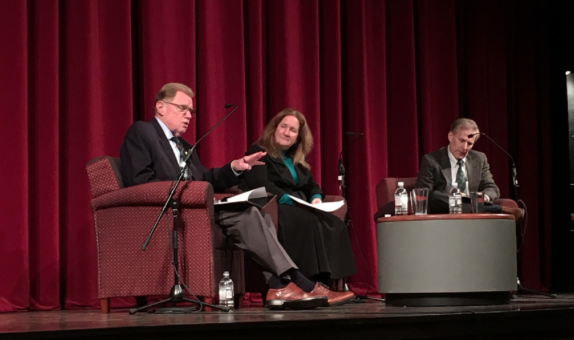Do you have the right to do drugs? Experts debate at UMass

More stories from Bryan Bowman

David Murray, left, moderator Katherine Newman and Jeffery Miron. (Bryan Bowman/Amherst Wire)
AMHERST — Do you have the right to do drugs?
This question was debated Wednesday night by David Murray, a former chief scientist for the federal government’s Office of National Drug Control Policy under President George W. Bush, and Dr. Jeffrey Miron, a libertarian economist at Harvard University.
The debate took place in Bowker Auditorium and was hosted by the University of Massachusetts Amherst University Union.
Miron, who argued in favor of the legalization of all drugs, is also the director of economic studies at the Cato Institute, a prominent libertarian think-tank. He is also the author of “Drug War Crimes: The Consequences of Prohibition,” and has long been a vocal advocate of ending the war on drugs.
“I think the question really should be ‘Why wouldn’t every individual in a free society … have the right to use drugs?’” Miron said in his opening statement.
Addressing the philosophy of drug laws, Miron conceded that “some individuals’ use of drugs adversely affects others,” but argued that there are “zillions of other products that can adversely affect others as well.” Miron said that if somebody skis too fast and crashes into somebody else, “nobody would then argue that skiing should be illegal.”
Miron stressed that the misuse of drugs is really the issue. He argued that there are already laws in place to handle issues such as driving under the influence or stealing from others to fund a drug habit.
In Miron’s assessment, prohibition does more harm to both individuals and the society as a whole because of the “unintended consequences” it produces.
“Whatever you think about drugs, if you think they’re good for your health or bad, moral or immoral, prohibition is much worse for everybody,” he said.
Miron said that the war on drugs has resulted in the creation of black markets, which increases violence and further perpetuates crime. He argued that stigmatization that comes with a criminal record as a result of drug crime is often more harmful to an individual than the drug itself and that minorities are disproportionately affected by the drug war. He cited Michelle Alexander’s book “The New Jim Crow.” He also pointed out that prohibition is very costly for the state to enforce.
“As a practical matter, which is worse, legalization or prohibition? The treatment or the disease? In my estimation the treatment, prohibition, is much worse,” he said.
Murray responded by arguing that legalization doesn’t erase the black market entirely, citing evidence that there is still a thriving illegal market for marijuana in states like Colorado, which legalized the drug.
“You can’t get rid of the criminal market by getting rid of prohibition. There’s still a black market in Colorado. They’ll still be there,” he said. “They fight. They’re violent … They will slaughter you unless you take them down,” Murray said, referring to drug cartels which operate in Central and South America.
He also challenged Miron’s assertion that prohibition is more costly to the state than legalization would be.
“My colleagues who have more expertise when it comes to alcohol have told me tax revenue on alcohol is dwarfed by the public health impacts … the same would be true for illegal drugs,” he said, arguing that prohibition acts as a deterrent for drug use.
As to the harm that criminal records cause drug users, Murray responded to Miron saying “‘you say the enforcement of drug laws has had negative effects on minorities in the inner cities, I agree. But you didn’t see what the drug use was doing.”
Murray was also critical of the libertarian philosophy that the decision to use drugs or not should be left to “autonomous adults.”
“We are autonomous individuals, but not just that. We’re social beings first. Society properly seen is a victim of drug use,” Murray said. “Am I my brother’s keeper? What is the answer if self-destruction is a right?”
Murray also argued that drug addiction is a disease of the brain and because of that, drug users can’t be seen truly autonomous.
“The very predicate of the right to use drugs is gone because it’s a disease,” he said.
Specifically on the issue of marijuana, Miron argued that it should be regulated similarly to alcohol and that the costs of prohibition are far worse for users than the effects of the drug itself.
Murray responded saying that “people contrast [marijuana] with alcohol saying it’s benign. It’s not.” He argued that many frequent marijuana users develop a dependency, and argued that the drug can cause “significant brain damage, IQ damage.” He called THC, an active molecule in marijuana, a “neurotoxin.”
On the issue of medical marijuana, Miron argued that it can be more effective than other pharmaceuticals such as opioid pills, while also having far fewer side effects.
Murray questioned the effectiveness of marijuana as a medicinal substance, citing that the drug still has not been approved medicinally by the U.S. Food and Drug Administration.
Email Bowman at [email protected] or follow him on Twitter @BryanBowman14.
